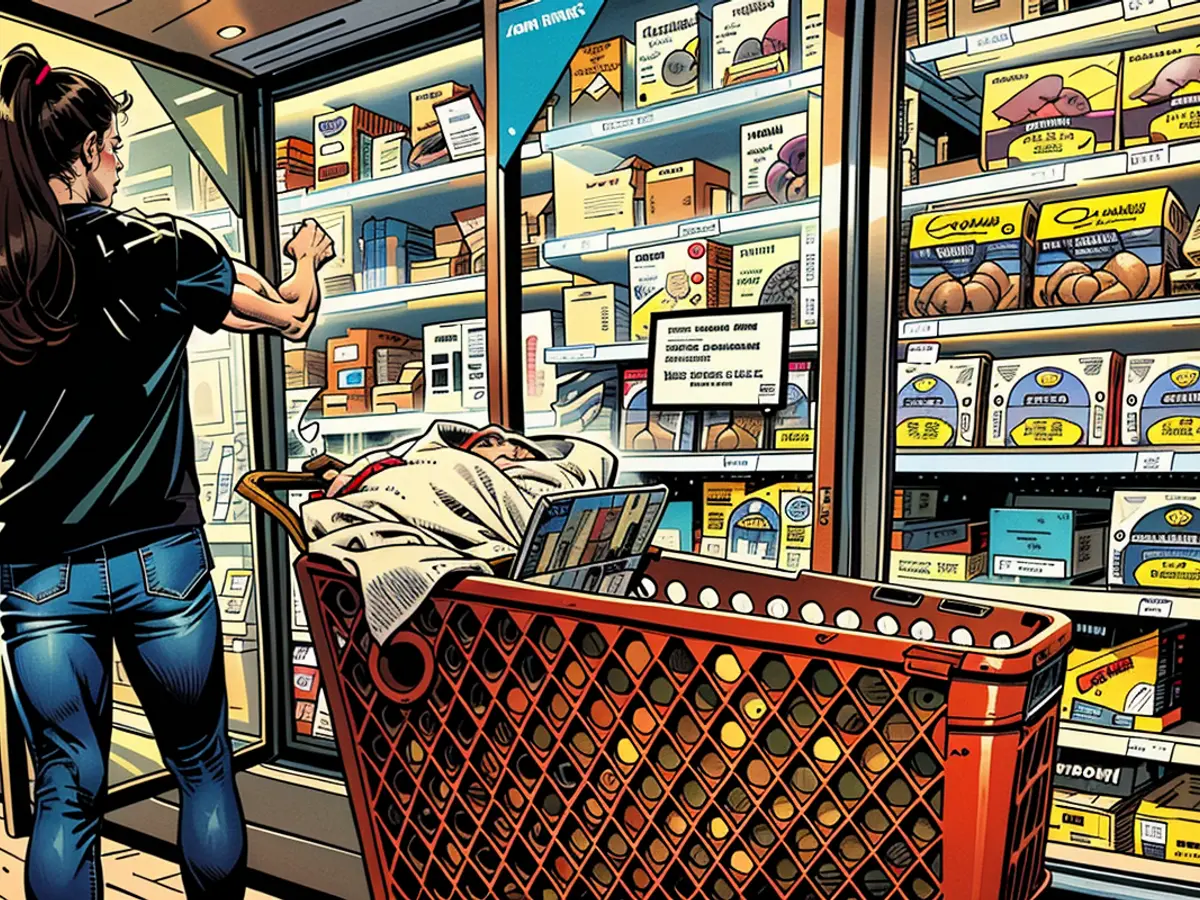Americans Express Frustration Over Rising Costs: A Viewpoint
The most recent Consumer Confidence survey by The Conference Board revealed that prices were still a primary concern for shoppers. They predicted an increase in both inflation and interest rates during the next year.
Although customers have been facing rising prices and higher interest rates for a while now, these circumstances have begun to take a toll on their spending. This impact will likely worsen in the following months, although it probably won't lead the US economy into a recession.
In the past, US consumer spending remained robust throughout 2023. The post-pandemic spending frenzy didn't fade, despite the high inflation. Consumers dipped into their pandemic savings and utilized more credit to maintain their spending levels. With practically everyone employed and perceiving an abundance of opportunities, this seemed like a good plan.
Flash forward to the present: Consumers are starting to struggle. Their pandemic savings are depleted. Wage rises are slowing. Household debt is surging quickly. The effect of heightened debt levels and interest rates is that consumers are now spending more on interest payments and less on goods and services.
Moreover, an increasing number of households are finding it difficult to service and repay debt, particularly those who have reached their credit card limits. Delinquencies are rising, and roughly a third of maxed-out borrowers were overdue in their payments over the past year, as per the New York Federal Reserve.
When questioned about their current and future financial situations, consumers' concerns have continued to increase since February. More now believe their situation is terrible, and fewer anticipate it will get better. Moreover, our Expectations Index, which is determined by consumers' short-term expectations for their income alongside business and employment market conditions, has been in the zone signaling a possible onset of recession for four continuous months.
Inflation lingers, interest rates could stay elevated, and uncertainty about the future is causing consumers to become more cautious. In April, retail sales stagnated, even declining on a month-over-month basis after adjusting for inflation. Spending on vehicles, sports equipment, and dining out was notably weak.

Leading retailers such as Walmart and The Home Depot confirmed the softer trends during their latest earnings presentations. Consumers have become less inclined to pay for non-essential items and are seeking cheaper alternatives to their typical purchases.
Walmart and Target responded by introducing promotions on 7,000 and 1,500 items, respectively, to encourage spending. While this may help cash-strapped consumers who must pay an average of $3 for a dozen eggs (nearly double the pre-pandemic price), these initiatives aren't likely to enhance consumption significantly. After all, services are now the primary drivers of inflation, according to our analysis. Increased costs for housing, utilities, transportation services, insurance premiums, and healthcare are the primary factors impacting consumer finances.
The slowing consumption trend is unlikely to abate. Back in January, our Consumer Confidence survey disclosed that customers intend to reduce their debts, postpone spending on financed items, and attempt to save more. When asked about the types of spending they'd curtail, consumers mostly chose dining out, clothing/fashion, entertainment, and vacations.
These behavioral changes are likely contributing to the recent softening of consumption. They will persist until inflation declines more significantly and interest rates begin to fall.
While these challenges are real and will weigh heavily on the economy for much of this year, they shouldn't be overestimated. Consumers aren't so strapped that they'll cut essential spending. Furthermore, the robust labor market will keep incomes on the rise. As a matter of fact, our most recent CEO Confidence survey suggests that the labor market will remain strong this year. The majority of executives plan to maintain or even expand their workforces. Most also anticipate increasing wages by more than 3% over the next 12 months.
Even though consumers' ability and enthusiasm to spend may suffer in the coming months, we don't expect it to result in a recession. As the economic tempo slows in the forthcoming months, we forecast that inflation will keep decelerating and stabilize at the Fed's 2% target by 2025. Subsequently, we expect the Fed to initiate rate cuts toward the end of 2024, providing some relief to debt-burdened consumers.

Read also:
In response to these financial challenges, many consumers are expressing their concerns and insights through shared opinions on social media platforms and forums. These discussions revolve around topics such as the impact of rising prices on everyday expenses and the effect of higher interest rates on their ability to pay off debts.
Amidst this, some consumers are providing their opinions on the potential long-term consequences of these economic conditions, predicting a possible shift in spending habits and a potential decrease in consumer confidence in the future.







